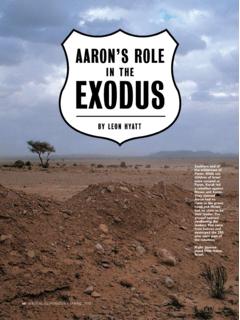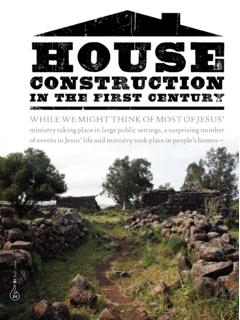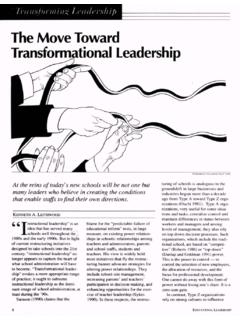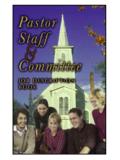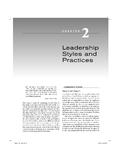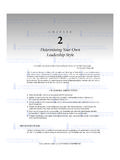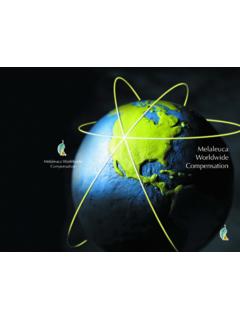Transcription of The Life Situation of T SAMUEL - St John Lutheran Church ...
1 The life Situation of SAMUELTHE BOOK OF SAMUEL , 1and 2 SAMUEL in the EnglishBible combined as one bookin the Hebrew Bible, is Israel s histori-cal record spanning approximatelyone hundred years from the final yearsof the judges to David s last years. Thisbrief period is one of the most signif-icant eras in Israel s entire those years, the loose tribalconfederation gave way to a central-ized, monarchical government, pat-terned after the countries surround-ing Israel. SAMUEL , Saul, and David arethe three main personalities featuredin the book. The book s writer provid-ed details regarding how they becameleaders and influenced Israel s nation-al development. The book bearsSamuel s name because of his promi-nence in the historical events recordedby the author. The life Situation of theBook of SAMUEL can be understood byexamining SAMUEL , the man and hisroles, Israel s transition from atribal confederacy to amonarchy, and politi-cal and social influ-ences on Israelfrom surrounding story of SAMUEL s birth,boyhood, and adolescence is told withinspiring simplicity.
2 SAMUEL s mother,Hannah, prayed for a son, promisingto dedicate him to the Lord s servicefor all of his life . After the Lordanswered her prayer, Hannah present-ed SAMUEL to Eli, the priest minister-ing in the sanctuary at Shiloh. Samuelbecame Eli s assistant, carrying outduties assigned to him by the demonstrated hisattentiveness to his mentor when hemistakenly thought he heard Eli call-ing him during the night. After thethird awakening, Eli perceived theLord was calling SAMUEL . SAMUEL fol-lowed Eli s instructions to respond tothe Lord s voice. He received theannouncement of the Lord s judg-ment on Eli s house. With reluctance,after persistent questioning from Eli,Lesson Reference:EBS: The Books of 1 and 2 SamuelSamuel conveyed the Lord s messageand gained his first experience as theLord s prophet.
3 This encounter withthe Lord constituted SAMUEL s call tobe a prophet. The Lord establishedSamuel s prophetic ministry by con-tinuing to speak to him. SAMUEL s rep-utation as a spokesman for the Lordspread throughout functioned as prophet,priest, judge, and king-maker duringhis lifetime. Although he performedpriestly responsibilities of carryingout sanctuary rituals, offering sacri-fices, counseling worshipers, and car-ing for the ark of the covenant, SAMUEL excelled in the propheticoffice. Because the Lord revealedHimself to SAMUEL at Shiloh, Samuelcontributed to a revival of the Shilohby James NewellBelow:BethelILLUSTRATOR PHOTO/ BOB SCHATZ (18/27/18)sanctuary. SAMUEL , through his faith-fulness to God s leadership, founded anew prophetic office for exerted influence as a prophetin a manner unlike anyone beforehim.
4 Subsequent prophets maintainedand enhanced Israel s spiritual life byfollowing SAMUEL s example of mak-ing known God s purposes for s service as judge inIsrael took place during the years fol-lowing the deaths of Eli and his called Israel to repentance regard-ing idolatry, delivered them fromPhilistine oppression, and adminis-tered justice at Bethel, Gilgal, Mizpeh,and Ramah. Eventually the Philistinesbegan to threaten Israel again, andSamuel s sons lost the Israelites confi-dence. Israel s elders expressed theirdemand for a king and placed Samuelin the unique position of being thelast judge and the first king-maker (1 Sam. 8:3,5,19-22).2 Israel s transition from a tribalconfederacy to a monarchy is an inter-esting study. The interdependentnature of the tribal relationshipschanged upon Israel s conquest andsettlement in Canaan.
5 As each tribesettled in its allotted territory, theunity that had characterized Israel sexperience came to an end. The com-mentary provided in Judges 21:25(NIV) is revealing: In those daysIsrael had no king; everyone did as hesaw fit. The Israelites failed to breakthe cycle of apostasy, judgment,repentance, and restoration typical oftheir existence after settling inCanaan. The Israelites did notrespond favorably, in the long term, tothe judges attempts to provide conti-nuity and motivation to maintainfaithfulness to the Lord. Theleadership at the tribal level22 Biblical Illustrator Spring2001 Mizpeh, modern Tel En-Nasbeh, one of the townswhere SAMUEL administered PHOTO/ BOB SCHATZ (9/21/13)Lower right:Excavations at Beersheba. SAMUEL s sons, Joeland Abijah judged PHOTO/DAVID ROGERS (4/8/9)decided that their circumstancesrequired a SAMUEL 8 is thebeginning of the account of themonarchy s establishment.
6 The subse-quent chapters provide details of theefforts to fulfill the Israelites desire fora request for a king came inresponse to two crises. The first crisiswas political in nature. Samuelentrusted some judicial responsibili-ties to his sons, Joel and Abijah, inBeersheba on Canaan s southern bor-der. Joel and Abijah lacked SAMUEL sintegrity, evidenced by the accusationof greed and bribery. Their actionsperverted justice, undermined thepublic trust, and provided Israel s eld-ers the opportunity to challenge thepolitical system administered by thejudges. The second crisis related to theperceived military threat of Israel sneighboring states. The Philistines,though subdued under SAMUEL s lead- ership , challenged Israel s security inthe hill country west of the JordanRiver. The Ammonites expressed hos-tility east of the Jordan.
7 The triballeadership thought the circumstanceswarranted a strong military of these crises alone may havecaused a different reaction in convergence set the stage for anew development in Israel s s attitude toward therequest for a king was negative. Hedemonstrated wisdom and maturityby seeking God s will in the matterSpring 2001 Biblical Illustrator 23before responding to the elders. TheLord interpreted the request for a kingas an outright rejection of divine lead- ership and equated the action withidolatry (1 Sam. 8:8). SAMUEL receivedGod s permission to grant the elders desire with a solemn warning regard-ing how the king s reign would impacttheir relayed the Lord s deci-sion to the people in the strongestterms. The king the people desiredwould exercise arbitrary and absolutepower by conscripting forced labor,seizing personal property, and levyingtaxes (vv.)
8 10-18). The description ofthe dangers represented by a kingshould have caused the elders toreconsider their demand. Instead, theyreiterated their the elders credit, they recognized the necessity ofthe Lord s involvement in the selec-tion of a king and followed SAMUEL sinstruction to return to their amount of time requiredfor the conversations between Samueland the elders is not specified. Theevents recorded in1 SAMUEL 8couldhave occurred in a single day. Thetransition from a tribal confederacy toa monarchy in theory occurred in thecourse of a judgment handed downfrom the Lord through SAMUEL to theIsraelites. As a practical matter, thetransition to the monarchy took placethrough a series of events over anundetermined time selection and establish-ment of Israel s first king is recordedin 1 SAMUEL 9 11.
9 The Lord instruct-ed SAMUEL to anoint Saul from thetribe of Benjamin as Israel s leader. Ina private ceremony, SAMUEL carriedout the Lord s command andinformed Saul about three signs hewould experience as affirmations ofGod s presence. Saul s presentation tothe Israelites occurred at Mizpeh,where SAMUEL revealed the Lord schoice of Saul to be Israel s king. TheIsraelites acclaimed Saul as their kingand returned to their homes to awaitthe opportunity for Saul to exercisehis leadership abilities. Saul won theIsraelites popular support by defeat-ing the Ammonites attempt to enslavethe inhabitants of Jabesh the victory, SAMUEL orderedthe people to return to Gilgal to reaf-firm Saul s s success asIsrael s first king wasshort lived. His inabilityto carry out the Lord sinstructions, given bySamuel, resulted in theLord s rejection of Saulas Saul of God sdecision to give thekingdom to a manafter his own heart (13:14;15:26).
10 TheLord sent SAMUEL toBethlehem to anointDavid son of Jesse as king (16:13).Under David s leadership,theIsraelites completed the transitionfrom a tribal confederacy to a experienced political andsocial influences from surroundingcountries. The immorality of Eli ssons regarding the women who servedat the entrance of the tent of meetingmay reflect Canaanite religious influ-ence in Israel (2:22). Canaaniteshrines included prostitution as a partof idol worship. The Canaanites wor-shiped fertility gods and goddesses,believing participation in sexual activ-ity in the idol s honor would guaran-tee agricultural s death, SAMUEL told the Israelitesto put away their foreign gods andserve the Lord only (7:3).The desire to be like other nationswas one of the motives behind theIsraelites request for a king (8:5). Thevalues of centralized authority, effi-cient administration, unity in pur-pose, and continuity of leadershipappealed to the Israelites.
